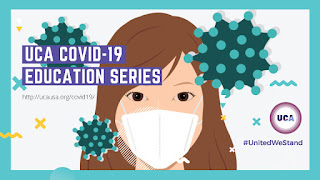30: What factors may increase the chance of COVID-19 infection?
Q: What factors may increase the chance of COVID-19 infection, and what should I do if I’m at a higher risk or if members of my household have this risk?
💁Tracy: If you are age 65 or over or are in a high-risk category, stay home and pay attention to signs of illness. Conditions that put you at a higher risk for a more severe COVID-19 case include elder age, heart and lung diseases, such as asthma, high blood pressure and heart failure. Other chronic diseases such as diabetes, cancer, and immunity disorders will play a role too.
Here are the symptoms to watch for:
Consult your doctor if you develop any of these symptoms and check the article of “What to do if I am sick?” for further information.
If you have the following symptoms, call your doctor or emergency hotline immediately:
Consult your doctor about your overall health condition and any other factors you should consider. Refer to “What steps should I take to decrease my risk of infection if I’m in a high-risk category?” for further information.
If members of your household are at risk of infection, help them monitor their health and minimize going outside the home and chance of the infection. If you must go out, take the same precautions you would do if you were at high risk. Prepare enough supply of needed medications ahead of time, if possible.
Simple Facts about COVID-19
Doctors now believe COVID-19 may be hitting older people and those with underlying conditions harder than other people because of changes in their immune function. As people age, their immunity goes down. Some diseases, like Type 2 Diabetes, also impacts the immune system. Certain medications may have effects on immunity. Check with your doctor or pharmacist to learn if any of your medications might cause such an effect. People with compromised immunity will be more susceptible to diseases like COVID-19.
Resources:
💁Tracy: If you are age 65 or over or are in a high-risk category, stay home and pay attention to signs of illness. Conditions that put you at a higher risk for a more severe COVID-19 case include elder age, heart and lung diseases, such as asthma, high blood pressure and heart failure. Other chronic diseases such as diabetes, cancer, and immunity disorders will play a role too.
Here are the symptoms to watch for:
- Fever
- Dry cough
- Shortness of breath
- Body aches
- Fatigue
- Some people have also reported changes in the sense of smell or taste, and other neurological symptoms
Consult your doctor if you develop any of these symptoms and check the article of “What to do if I am sick?” for further information.
If you have the following symptoms, call your doctor or emergency hotline immediately:
- Difficulty breathing
- Confusion
- Pain or pressure in the chest
- A blue tint to skin
Consult your doctor about your overall health condition and any other factors you should consider. Refer to “What steps should I take to decrease my risk of infection if I’m in a high-risk category?” for further information.
If members of your household are at risk of infection, help them monitor their health and minimize going outside the home and chance of the infection. If you must go out, take the same precautions you would do if you were at high risk. Prepare enough supply of needed medications ahead of time, if possible.
Simple Facts about COVID-19
Doctors now believe COVID-19 may be hitting older people and those with underlying conditions harder than other people because of changes in their immune function. As people age, their immunity goes down. Some diseases, like Type 2 Diabetes, also impacts the immune system. Certain medications may have effects on immunity. Check with your doctor or pharmacist to learn if any of your medications might cause such an effect. People with compromised immunity will be more susceptible to diseases like COVID-19.
Resources:
- https://www.cdc.gov/coronavirus/2019-ncov/need-extra-precautions/older-adults.html
- https://www.statnews.com/2020/03/30/what-explains-coronavirus-lethality-for-elderly/
- https://www.cnn.com/2020/03/11/health/coronavirus-cold-allergies-flu-difference-symptoms-wellness-trnd/index.html
- https://www.nfid.org/infectious-diseases/common-questions-and-answers-about-covid-19-for-older-adults-and-people-with-chronic-health-conditions/
- https://www.ncbi.nlm.nih.gov/pubmed/31657690
- https://www.cdc.gov/coronavirus/2019-ncov/need-extra-precautions/older-adults.html
- https://www.statnews.com/2020/03/30/what-explains-coronavirus-lethality-for-elderly/
- https://www.cnn.com/2020/03/11/health/coronavirus-cold-allergies-flu-difference-symptoms-wellness-trnd/index.html
- https://www.nfid.org/infectious-diseases/common-questions-and-answers-about-covid-19-for-older-adults-and-people-with-chronic-health-conditions/
- https://www.ncbi.nlm.nih.gov/pubmed/31657690
Writing: Debbie Vilardi; Proofreading: Helen Shih; Artwork: Qiong Mo
Disclaimer and Copyright © 2020 United Chinese Americans











